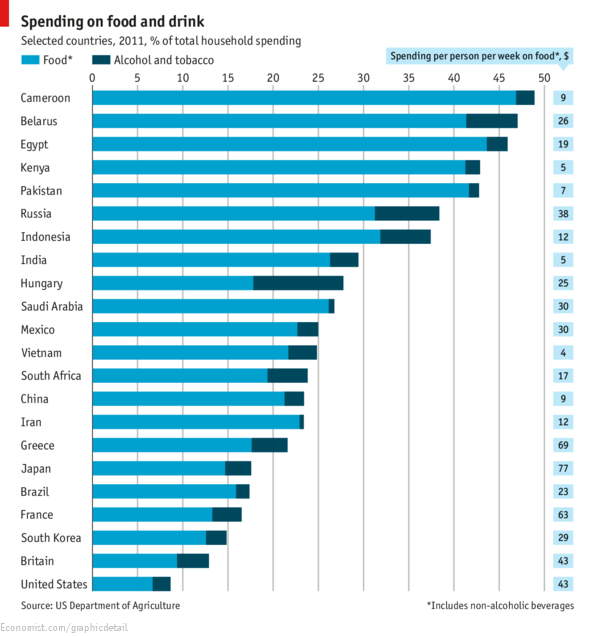Of course, the world is not full of affluent population--we cannot afford to be misled by the exceptional affluence here in the US that has made food so inexpensive:
 |
| Image source |
Against such a background, we are also certain that the global population will increase by at least another two billion people, if not even more. The higher numbers, along with the projected increase in affluence, means one undeniable aspect of life--we will need to produce more food.
Producing more food begins with increasing agricultural yields. Not merely because of the growth of the vegetarian population--that will be a much slower growth compared to the demand for animal protein. All those animals have to be fed.
Hence my worries over the sustained opposition to GM food. The Scientific American has a "food issue" in which there is this lengthy piece on GM crops:
[Despite] overwhelming evidence that GM crops are safe to eat, the debate over their use continues to rage, and in some parts of the world, it is growing ever louder. Skeptics would argue that this contentiousness is a good thing—that we cannot be too cautious when tinkering with the genetic basis of the world's food supply. To researchers such as Goldberg, however, the persistence of fears about GM foods is nothing short of exasperating. “In spite of hundreds of millions of genetic experiments involving every type of organism on earth,” he says, “and people eating billions of meals without a problem, we've gone back to being ignorant.”This is a battle that has been going on for decades now. We might even find a peaceful solution to the Israel-Palestine issue before we sort out the GM crop disagreements. So, where do we go from here?
So who is right: advocates of GM or critics? When we look carefully at the evidence for both sides and weigh the risks and benefits, we find a surprisingly clear path out of this dilemma.
There is a middle ground in this debate. Many moderate voices call for continuing the distribution of GM foods while maintaining or even stepping up safety testing on new GM crops. They advocate keeping a close eye on the health and environmental impact of existing ones. But they do not single out GM crops for special scrutiny, the Center for Science in the Public Interest's Jaffe notes: all crops could use more testing. “We should be doing a better job with food oversight altogether,” he says.I doubt we will reach any middle ground on this, given the deep trenches that have been dug.
Meanwhile, the race is on to label foods, which this Scientific American editorial notes is "a bad idea":
We have been tinkering with our food's DNA since the dawn of agriculture. By selectively breeding plants and animals with the most desirable traits, our predecessors transformed organisms' genomes, turning a scraggly grass into plump-kerneled corn, for example. For the past 20 years Americans have been eating plants in which scientists have used modern tools to insert a gene here or tweak a gene there, helping the crops tolerate drought and resist herbicides. Around 70 percent of processed foods in the U.S. contain genetically modified ingredients.But, isn't sticking a label on the food better for consumer choice? Consumers can then buy whatever they want to buy? Not really:
Instead of providing people with useful information, mandatory GMO labels would only intensify the misconception that so-called Frankenfoods endanger people's health [see “The Truth about Genetically Modified Food”].
Many people argue for GMO labels in the name of increased consumer choice. On the contrary, such labels have limited people's options. In 1997, a time of growing opposition to GMOs in Europe, the E.U. began to require them. By 1999, to avoid labels that might drive customers away, most major European retailers had removed genetically modified ingredients from products bearing their brand. Major food producers such as Nestlé followed suit. Today it is virtually impossible to find GMOs in European supermarkets.So, to recap: where will all the additional food crop production come from to feed the growing population that will also be more affluent?
Americans who oppose genetically modified foods would celebrate a similar exclusion. Everyone else would pay a price. Because conventional crops often require more water and pesticides than GMOs do, the former are usually more expensive. Consequently, we would all have to pay a premium on non-GMO foods—and for a questionable return.
2 comments:
This is a particularly European problem. GM crops are already fairly widespread in the US and in the developed world. When there is pressure on food prices and shortage, the poor will care two hoots about anything else.
My forecast is that there will be pockets in the world where there will be bans and resistance, chiefly in Europe. In other places it will find its own way - when food prices rise, opposition will diminish
Unfortunately, the "intellectuals" and leftist-activists outside Europe--in India, too--have bought into the European dogma. I suppose they prefer to continue to be colonies of European ideas even after their independence!
After blogging, a few minutes ago, I read this on the destruction of the Golden Rice experimental farm at IRRI's land in the Philippines ... by anti-GM food activists, while the real farmers stood aside, and one 50-year old man bursting into tears on seeing rice plants being trampled upon and yanked out :(
http://t.co/S8D78tUvv5
I wonder why Arundhati Roy is not there already!!!
Post a Comment